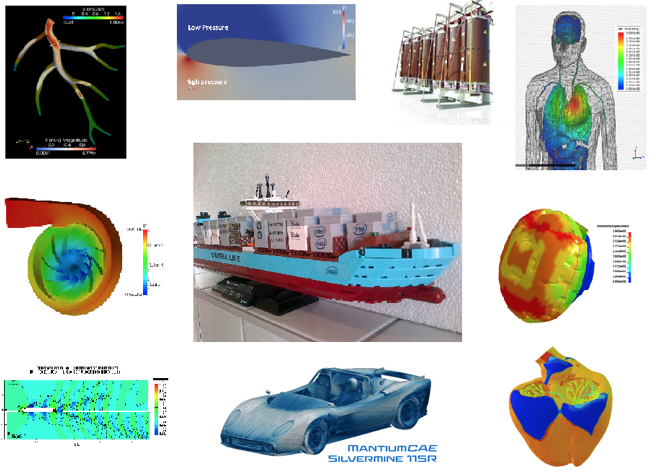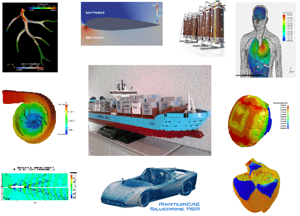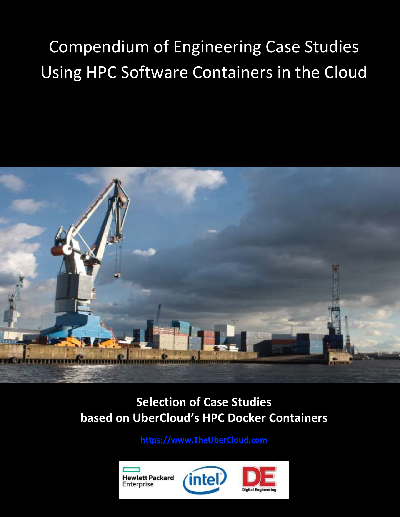
Download the UberCloud Container Compendium
UberCloud started in March 2013 with developing High Performance Computing (HPC) layers on top of Docker. In short, Docker, developed by Docker, Inc., is an open source code running on Linux that performs operating-system-level virtualization, also known as "containerization". Docker is used to run software packages called "containers".
Two years later, in 2015, we reached an important milestone when we introduced our UberCloud HPC software containers. It turned out that use of these containers shortened project times dramatically, from an average of previously three months to just a few days. Containerization drastically simplifies the access, use and control of HPC resources, applications, and data, whether on premise or remotely in the cloud. Essentially, users are working with a powerful remote desktop in the cloud that is as easy and familiar to use as their regular inhouse desktop workstation. Users don’t have to learn anything about HPC, nor system architecture, nor cloud, for their simulation projects. This approach will inevitably lead to the increased use of HPC for every engineer’s daily design and development, even for novice HPC users. That’s what we call “democratization of HPC”.
For this UberCloud Container Compendium we have selected 21 case studies from engineering cloud projects which all used UberCloud’s novel HPC container technology. The objective is to demonstrate the wide applicability of Docker based HPC containers for really complex engineering and scientific applications, on different single- and multi-node cloud infrastructures.
You can download the Compendium for free by filling in the form!

UberCloud Container Compendium –Table of Contents
Introduction: Toward Ubiquitous HPC – With HPC Containers
Team 143: Clinical Cancer Genomics Pipeline on Amazon AWS
Team 156: Pulsatile flow in a Right Coronary Artery Tree on Amazon AWS
Team 159: Aerodynamic Study of an Airfoil in UberCloud’s OpenFOAM Container
Team 169: Blood Flow through Cardiovascular Medical Device Using OpenFOAM
Team 177: Combustion Training in the Cloud
Team 181: Predicting Barehull Containership Resistance in the CPU 24/7 Cloud
Team 182: CFD Modelling and Optimization of Transformers in the Azure Cloud
Team 183: Radial Fan CFD Simulation in the Azure Cloud
Team 186: Airbag simulation with ANSYS LS-DYNA on Azure
Team 190: CFD Simulation of Airflow within a Nasal Cavity on Azure
Team 193: Implantable Planar Antenna Simulation on Nephoscale Cloud
Team 195: Simulation of Impurities Transport in a Heat Exchanger Using OpenFOAM
Team 197: Studying Drug-induced Arrhythmias of a Human Heart on Advania
Team 199: Peptide Benchmark Using Molecular Dynamics on Amazon AWS
Team 200: Simulation of Neuromodulation in Schizophrenia on Advania
Team 201: Maneuverability of a KRISO Container Ship Model in the Cloud
Team 203: Aerodynamic Study of a 3D Wing Using ANSYS CFX
Team 204: Aerodynamic Simulations using MantiumFlow in Advania Data Centers
Team 205: Vehicle Crash Simulation in the Opin Kerfi Cloud
Team 206: Establishing the Design Space of a Bioreactor on Microsoft Azure
Team 211: Deep Learning for Predicting Steady-State Fluid Flow in the Advania Cloud
Download the Compendium for free by filling in the form.
We are extremely grateful for the support of our UberCloud experiments by Hewlett Packard Enterprise and Intel, and by our primary Media Sponsors Digital Engineering, HPCwire, insideHPC, and the invaluable case studies they supported, as well as the UberCloud Compendium series.

